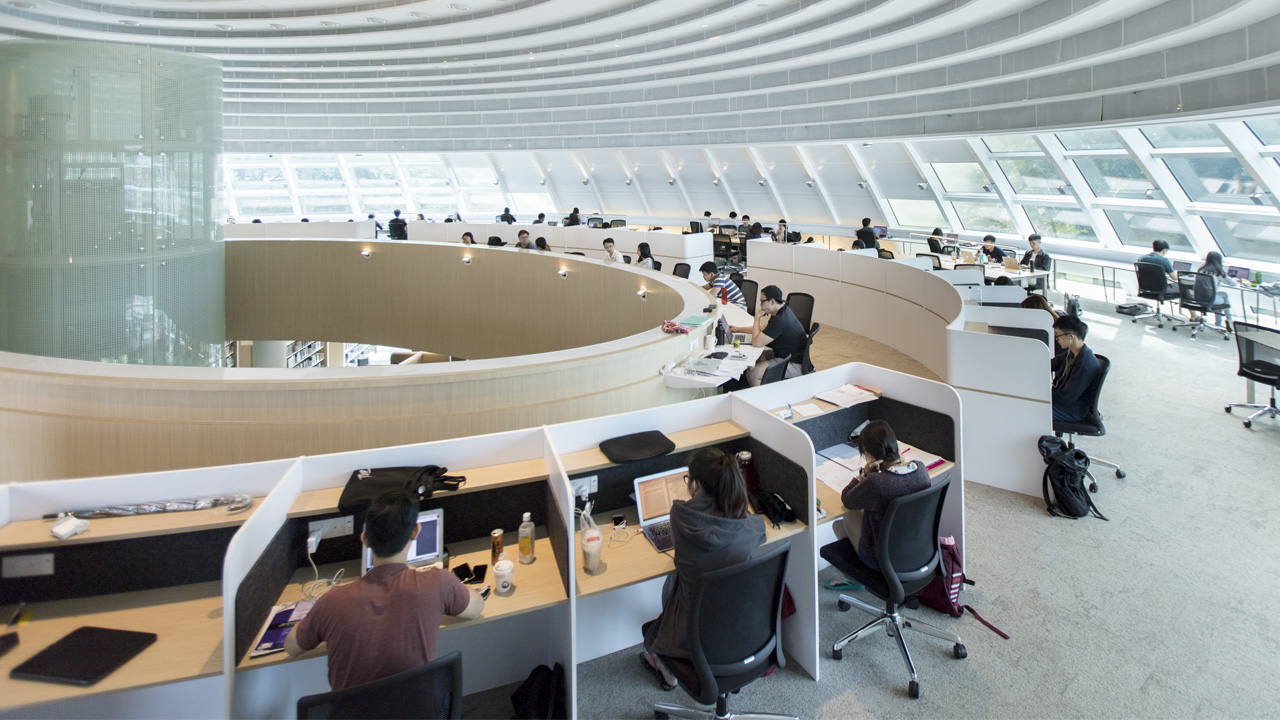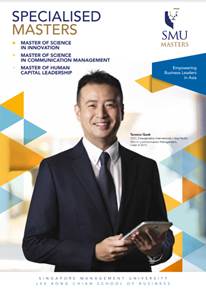
SMU’s Master of Science in Innovation programme arms budding entrepreneurs with the latest skills, practical experience and social networks they need to successfully launch their next big idea.
In a complex economic environment when disruption has become the norm and headlines are dominated by tech-billionaires, it’s no surprise that there are more startups, entrepreneurs and venture capitalists today than ever before. According to a 2015 report, over three businesses are born worldwide every second, and their success or failure depends on whether business creators have the relevant knowledge and competencies to tackle tomorrow’s innovation challenges.
To this end, SMU’s MSC in Innovation (MI) programme offers a cross-disciplinary and practical innovation and entrepreneurship education through a world-class faculty, regular engagement with influential practitioners, stints at the renowned Babson College in the US, and practical innovation activities. The latter includes the Capstone Innovation Project, in which participants apply key MI learning outcomes to a specific innovation challenge, such as creating digital marketing platforms and apps to help individuals and businesses.
Recently, e27 spoke with three MI programme participants, whose incubated startups officially launched on 22 May.
THINKING OUT OF THE BOX
A startup was the last thing on Karen Cheah’s mind when she enrolled in SMU’s MI programme.
“I was concentrating on making change within organisations and being an intrapreneur,” says Karen, who comes from the media industry, which has experienced considerable volatility of late.
“A significant amount of ‘disruption’ has taken place in the industry in the past five years. I witnessed colleagues, entire departments and organisations being made redundant, all in the name of ‘disruption’ and ‘innovation’”, Karen added. “I felt it was important for me to get into a programme that would provide context and relevance to the changes taking place and the MI programme provided that.”
The programme helped Karen to understand and harness the true meaning of the buzzwords she encountered daily at work.
“The biggest takeaway was the misuse of the terms ‘disruption’ and ‘innovation’. It’s the importance of creating value for a customer. Innovation is not just about tech, but about people and providing value. And in disruption, it was again about serving the under-valued customer,” she expressed.
“The second biggest takeaway was how we can create change within organisations and be intrapreneurs and not just entrepreneurs. (I recognised) the importance of talent and how to capitalise on opportunity and people. And not just dismiss the relevance and significance of human capital in an organisation undergoing change.”
The programme also sparked a business idea. Karen’s startup, AlterPacks, is a fresh take on the traditional packaging industry, and seeks to replace cardboard with a sustainable alternative using agrarian waste. This newly engineered material is also biodegradable, which minimises its impact on the environment.
Karen says moving her idea from the classroom to real life was a huge leap that was enabled, in large part, by the knowledge and hands-on components of the course.
“The academic side of it drills you with the necessary financial, strategic and management learnings,” she says. “Then the Capstone project and the presentations in Babson College and to the VCs and industry experts, provide the industry context to hone your skills to make your business relevant, help you pivot when necessary, and fail fast.”
Working with the MI programme’s professors and industry experts also proved particularly useful for Karen, who describes their advice as an invaluable “sounding board” in shaping her business strategy.
“What’s really good is knowing that they are on your side despite the constant challenges,” she concluded.
SEA CHANGE AHEAD
Like Karen, inspiration struck Raymond Tan before he expected it. Raymond, who describes himself as having “a lot of ideas”, joined SMU’s MI programme with the intention of creating a solid foundation for taking his business ideas forward.
“I wanted to build a framework to determine which ideas to pursue and common pitfalls to watch out for and avoid in the innovation journey,” says Raymond, whose focus is the maritime industry. His startup, Constant Bearing, addresses how “various stakeholders plan and collaborate over the course of the port call”.
Raymond started Constant Bearing in January. It coincided with his starting the MI programme, which was much sooner than he had expected.
“While I would’ve liked to have postponed my startup journey till after I’d reaped the full benefits of the MI programme, it felt like a generational opportunity which may no longer be there down the road,” he explains.
Timing aside, Raymond acknowledged the significant ways the MI programme has helped him take his idea from strategic ideation to market launch.
“I think a deceptively simple but easily overlooked part is about design thinking and ensuring you’re building something someone is willing to pay for,” he says, while also noting the invaluable professional and personal support he received during the programme.
“I’ve met various people who are helpful at different points of my journey and have been able to reach out to professors from other academic areas such as Logistics, or Six Sigma experts from SMU’s admin team to seek their input and advice,” says Raymond.
“My batchmates are also extremely supportive and we were able to inspire each other and push each other onwards.”
NATURAL ADVANTAGE
Skin irritation was the unlikely catalyst behind Tan Jing Jun’s natural deodorant line, Jomingo. Surprised by an unpleasant reaction from using conventional deodorants, Jing Jun discovered upon further investigation that these were filled with potentially harmful chemicals.
Searching for natural deodorants in Singapore, however, proved fruitless. Jing Jun, who has 15 years of marketing experience, quickly identified a gap in the market after realising that most natural deodorants came from the US, Australia and Europe.
In response, she formulated her own natural deodorant through trial and error, crafting a product that won over her friends and family. Each of Jomingo’s products uses ingredients that are non-GMO, free from artificial preservatives, and are ethically sourced from the region to minimise their carbon footprint. They are also packed in environmentally friendly packaging, so as not to add to the global plastic waste problem.
Initial sales at a recent SMU roadshow were particularly encouraging, compelling Jing Jun to take her product to a larger audience.
“I’ve always wanted to be an entrepreneur,” Jing Jun admitted. “I enrolled myself in the MI programme to gather more knowledge about setting up my own business and also to network with like-minded people. The Capstone project provided an opportunity to learn about the market sentiments about my business idea and to test it out before I take it to the next level,” she adds.
Jing Jun says the MI programme has helped her on both strategic and practical fronts. She’s currently working on Jomingo’s design concept with a designer whom she found through her MI classmates’ network.
She also says the programme has imparted crucial lessons about organisational cultural behaviour and design thinking. “I learned how to set up my desired company culture to attract the right people and how to think out of the box, be creative in problem solving and develop processes unrestricted by convention,” she says.
—
Are you ready to walk the path of entrepreneurship or perhaps enhance it? Learn more about how the SMU-MSc in Innovation Programme can impart the proper skillsets and discipline for your journey.
This article was reproduced with permission from e27.co
Speak to our Admissions Advisors
Lee Kong Chian School of Business
Postgraduate Admissions
Singapore Management University
Level 4, Postgraduate Programmes Office
50 Stamford Road, Singapore 178899
Tel: +65 6828 0882
